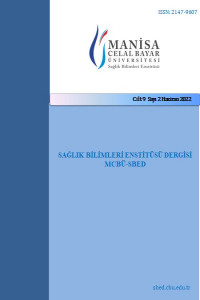Öz
Objective: Small cell lung cancer (SCLC) accounts for approximately 15% of all lung cancers. The prognosis in small cell lung cancer is still poor despite the use of new chemotherapeutic agents, the development of radiotherapy (RT) techniques, and the addition of prophylactic cranial irradiation (PCI). Predetermination of prognostic factors in lung cancer is very important in terms of treatment and follow-up. Since most of such studies were conducted with patients with non-small cell lung cancer, we evaluated treatment outcomes and prognostic factors in our patients with small cell lung cancer.
Materials and Methods: 123 Small Cell Lung Cancer Cases Treated İn Our Hospital Between 2002 And 2017 Were Evaluated. Patient Files Were Reviewed Retrospectively.
Results: 102 of the patients were male, and the median age was 61 (29-81). Initially, 59 patients had weight loss, the most common complaint was cough. 72 (58.5) were limited stage, 51 (41.5%) were extensive stage. The tumor was located on the right side in 68 patients. 24 patients had a family history. 48 patients had a history of comorbidity and 119 had a history of smoking. Radiotherapy was applied curatively in 63 (51.2%) patients and palliatively in 60 patients. 55 patients received radiochemotherapy. The number of chemotherapy cycles was 5 or more in 79 patients, and 4 or less cycles were applied in 44 patients. 68 patients received PCI. The mean follow-up period was 19.2 months. One-year overall survival rate was 62.2%, 2-year survival rate was 30.1%, and overall survival for 15 months and progression-free survival was 15%. Local recurrence developed in 59 patients and distant metastasis developed in 47 patients. Stage, age, ECOG, weight loss, development of cranial metastases, headache at baseline, dyspnea and number of chemotherapy cycles; was found to be statistically significant in overall survival. ECOG, weight loss, gender and number of CT cycles were found to be significant in progression-free survival.
Conclusion: Although significant progress has been made in the treatment of SCLC, the expected increase in survival rates has not yet been achieved. The survival rates in our study are consistent with the literature. The addition of PCI to the treatment at the limited stage significantly reduces brain metastasis. Although the addition of PCI to the treatment in diffuse stage disease without brain metastases was not found to be effective on overall survival, it was observed that the development time of brain metastasis was prolonged. Many studies have shown an increase in survival with thoracic radiotherapy and PCI application in small cell lung cancer, and the role of radiotherapy is gradually increasing. The potential benefits and risks for each patient should be determined prior to initial therapy and personalized therapy should be planned.
Anahtar Kelimeler
lung cancer small cell lung cancer radiotherapy profilactic cranial radiotherapy
Kaynakça
- 1. Bray F, Ferlay J, Soerjomataram I, Siegel RL, Torre LA, Jemal A. Global cancer statistics 2018: GLOBOCAN estimates of incidence and
- mortality worldwide for 36 cancers in 185 countries. CA Cancer J Clin [Internet]. 2018 Nov [cited 2019 Dec 6];68(6):394–424. Available
- from: http://doi.wiley.com/10.3322/caac.21492
- 2. Kara F, İlter H, Müdürlüğü BK-HSG, Bakanlığı S, 2018. Türkiye kanser istatistikleri 2015.
Öz
Giriş ve Amaç: Küçük hücreli akciğer kanseri (KHAK) tüm akciğer kanserlerinin yaklaşık %15’ini oluşturmaktadır. Küçük hücreli akciğer kanserinde prognoz; yeni kemoterapotik ajanların kullanılması, radyoterapi (RT) tekniklerinin gelişmesi ve profilaktik kraniyal ışınlamanın (PKI) eklenmesi ile tedavi sonuçları iyileşmesine rağmen halen kötüdür. Akciğer kanserinde prognostik faktörlerin önceden belirlenmesi tedavi ve takip açısından çok önemlidir. Bu tür çalışmaların çoğu küçük hücreli dışı akciğer kanserli hastalarla yapıldığı için çalışmamızda küçük hücreli akciğer kanserli olgularımızda tedavi sonuçlarını ve prognostik faktörleri değerlendirdik.
Gereç ve Yöntemler: Hastanemizde 2002–2017 yılları arasında tedavi edilen 123 küçük hücreli akciğer kanserli olgu değerlendirmeye alındı. Retrospektif olarak hasta dosyaları tarandı.
Bulgular: Hastaların 102’si erkek olup, medyan yaş 61 (29-81) olarak saptandı. Başlangıçta 59 hastada kilo kaybı vardı, en sık şikayet öksürüktü. 72’si (58.5) sınırlı, 51’i (%41,5) yaygın evreydi. Tümör 68 hastada sağ taraf yerleşimliydi. 24 hastada aile öyküsü vardı. 48 hastada ek hastalık ve119’unda sigara öyküsü vardı. Radyoterapi 63 (%51,2) hastada küratif, 60 hastada palyatif olarak uygulandı. 55 hasta radyokemoterapi aldı.79 hastada kemoterapi kür sayısı 5 ve üzerinde olup,44 hastada 4 ve daha az sayıda kür uygulandı.68 hasta PKI aldı. Ortalama izlem süresi 19.2 aydı. Bir yıllık genel sağ kalım%62,2, 2 yıllık sağkalım%30,1 ve genel sağ kalım 15 ay ve progresyonsuz sağkalım %15 olarak bulunmuştur. 59 hastada lokal nüks, 47 hastada uzak metastaz gelişti. Evre, yaş, ECOG, kilo kaybı, kraniyal metastaz gelişmesi, başlangıçta başağrısı, dispne ve kemoterapi kür sayısı; genel sağ kalımda istatistiksel olarak anlamlı bulunmuştur. ECOG, kilo kaybı, cinsiyet ve KT kür sayısı progresyonsuz sağ kalımda anlamlı bulunmuştur.
Sonuç: KHAK’nin tedavisinde önemli mesafeler alınmasına karşılık, sağ kalım oranlarında beklenen artış henüz sağlanamamaktadır. Çalışmamızda sağ kalım oranları literatürle uyumludur. PKI’nın sınırlı evrede tedaviye eklenmesi belirgin şekilde beyin metastazını azaltmaktadır. Beyin metastazsız yaygın evre hastalıkta PKI’nın tedaviye eklenmesi genel sağ kalım üzerine etkili bulunmamakla birlikte beyin metastazı gelişme süresinin uzadığı görülmüştür. Küçük hücreli akciğer kanserinde torasik radyoterapi ve PKI uygulamasıyla bir çok çalışmada sağ kalımda artış görülmüş olup, radyoterapinin rolü giderek artmaktadır. Her hasta için potansiyel fayda ve riskler başlangıç tedavisinden önce belirlenmeli ve kişiye özel tedavi planlanmalıdır.
Anahtar Kelimeler
akciğer kanseri küçük hücreli akciğer kanseri radyoterapi profilaktik kranyal radyoterapi
Kaynakça
- 1. Bray F, Ferlay J, Soerjomataram I, Siegel RL, Torre LA, Jemal A. Global cancer statistics 2018: GLOBOCAN estimates of incidence and
- mortality worldwide for 36 cancers in 185 countries. CA Cancer J Clin [Internet]. 2018 Nov [cited 2019 Dec 6];68(6):394–424. Available
- from: http://doi.wiley.com/10.3322/caac.21492
- 2. Kara F, İlter H, Müdürlüğü BK-HSG, Bakanlığı S, 2018. Türkiye kanser istatistikleri 2015.
Ayrıntılar
| Birincil Dil | Türkçe |
|---|---|
| Konular | Onkoloji ve Karsinogenez |
| Bölüm | Araştırma Makalesi |
| Yazarlar | |
| Yayımlanma Tarihi | 30 Haziran 2022 |
| Yayımlandığı Sayı | Yıl 2022 Cilt: 9 Sayı: 2 |


